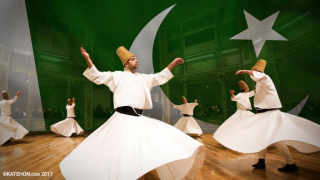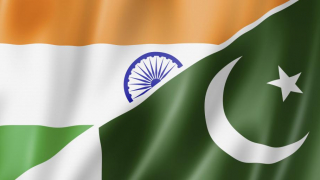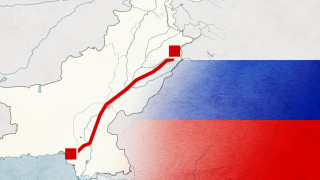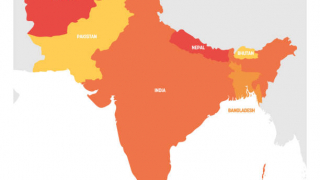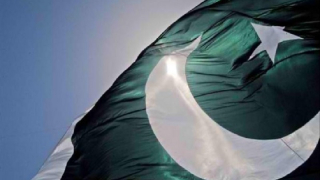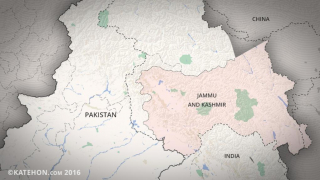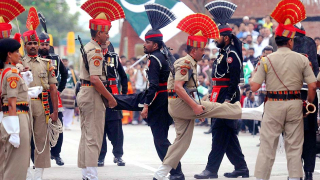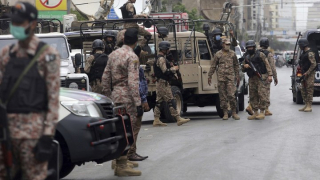General Bajwa's Visit to Kabul: Was it a Win or a Loss?
12.06.2020
On June 09, 2020, Pakistan's Chief of Army Staff (COAS) General Qamar Javed Bajwa arrived in Kabul, Afghanistan along with the Director General of Inter Services Intelligence (ISI) Lt. Gen. Faiz Hamid on a one-day visit. Ambassador Mohammad Sadiq, Pakistan's Special Envoy to Afghanistan was also accompanying COAS and DG ISI.
During his visit, Gen. Bajwa met with the Afghan President Ashraf Ghani and Chairman High Council for National Reconciliation of Afghanistan, Dr. Abdullah Abdullah.
It is of utmost importance to pay special attention to the timing of the visit, matters discussed, post-visit attitudes (on both sides) and the contemporary political situation in the region. The visit by Pakistani officials came at a time when intra-Afghan talks are expected to resume by the end of June 2020. This was the first visit by any high ranking Pakistani official to Afghanistan since the beginning of President Ghani's second term in office.
Furthermore, this visit was preceded by the visit of U.S. Special Representative for Afghanistan Reconciliation Zalmay Khalilzad to Pakistan on June 07, 2020 where he met with Gen. Bajwa to discuss matters of mutual interest including Afghan refugees issue, Afghan Reconciliation Process and Pak-Afghan border management. After his Pakistan, Mr. Khalilzad then had a meeting with a delegation of the Afghan Taliban on June 08, 2020 in Doha, Qatar as well.
The June 09 meetings between General Bajwa and the Afghan leadership concentrated on matters of mutual interest such as effective border management, Afghan peace process, dignified and time bound return of Afghan refugees, facilitation of trade & connectivity between the two neighbouring countries.
There was mutual agreement by both sides on not letting their respective territories be used by anyone against each other. General Bajwa reiterated the point that Pakistan will always facilitate Afghan-led and Afghan-owned peace process and will always help its brotherly neighbouring country to achieve peace and stability.
The response from the Afghan side was also very positive and encouraging which will further hopefully facilitate in improving the current stranded relationship between Pakistan and Afghanistan. In a statement, President Ghani appreciated Pakistan's constructive role in the Afghan peace process.
President Ghani in particular praised the initiative of Prime Minister Imran Khan to open Torkham and Chaman borders to facilitate trade and return of Afghan citizens to their country coming from abroad via Pakistan during this COVID-19 global crisis.
Dr. Abdullah in his statement said that the talks between the Pakistani delegation and Afghan leadership were very productive. He further highlighted that the Afghan government is ready to talk with the Afghan Taliban on common issues to end the conflict in the country and achieve peace. He reiterated Pakistan's positive role in the Afghan peace process as well.
Although anything can happen in international affairs and matters can take unexpected turns, as evident from history of Pak-Afghan relations but it is safe to say that with recent developments, things are looking up for Pak-Afghan relations and for peace & stability returning to Afghanistan.
However, any improvement in Pak-Afghan bilateral relations and prospects of peace in Afghanistan are always at the cost of Indian interests in the region. The reason for this is the fact that for India, international affairs is a zero-sum game where it is constantly in pursuit of absolute gains with a total disregard for international law, regional cohesion, peace & stability.
For India, improving bilateral ties between Pakistan and Afghanistan means loss of ground in Afghanistan on multiple fronts. India invested heavily in Afghanistan to create an environment of chaos and unrest in Afghanistan for its own vested political and strategic interests. The purpose of establishing such a negative and volatile environment is to keep Pakistan engaged unnecessarily in a perpetual conflict with its western neighbour, which of course is highly beneficial for India.
It is no secret that India has been sponsoring extremist and terror elements such as Islamic State - Khorasan Province (ISKP) and Tehrik-i-Taliban Pakistan (TTP) within Afghanistan to keep the country ravaged in endless violence and conflict.
For India, it is an alarming situation that Pakistan has been instrumental and successful in making the Afghan people and leadership realize that it is all in favour for a peaceful Afghanistan and that only political dialogue/negotiations with all stakeholders is the only way to achieve peace and stability in the country. The Pakistani political and military leadership has been regularly reiterating that a peaceful Afghanistan is integral for a peaceful Pakistan.
Moreover, along with the Afghan leadership, Pakistan also enjoys the confidence of the all regional and extra-regional powers (including the US & Iran) that it is an instrumental and a natural stakeholder in the Afghan peace process. So far, Pakistan has been successful in convincing both parties (US and Afghan Taliban) for intra-Afghan peace talks as well that are speculated to take place in Doha soon.
On the other hand, India, "America's strategic partner" has failed to convince the US that it can play any role for a peaceful exit of the US forces from Afghanistan. Other regional powers like Russia and China are also apprehensive and suspect about India's positive role in Afghanistan as well. They are aware of the fact that India is only interested in Afghan affairs to be able to put pressure on Pakistan.
In the coming days, it is possible that the Afghan leadership will meet with the Afghan Taliban. Before entering into negotiations, it is important for Afghanistan to select representatives that are completely clear about the end goal, which is peace in Afghanistan.
It is pertinent for Afghan representatives to keep in mind that the Afghan Taliban will be dealing from a position of strength, given their recent success in past negotiations, so pragmatism instead of hollow machismo grounded in emotions is to be adopted. Furthermore, it should also be kept in mind that Pakistan is all for a peaceful Afghanistan and on its side as there are many elements who are constantly working to sabotage the Afghan peace process and derail the progress being made in Pak-Afghan ties.
There should be no doubt in anyone's mind that Pakistan respects Afghanistan and its people. The former does not support any ethnicity in particular and respects all ethnicities in latter's diverse demographic landscape. Propaganda like 'strategic depth' hold no water and is something that no one believes to be true. Pakistan realizes the importance of having a peaceful neighbourhood and believes in the sanctity of respecting the sovereignty of other nation-states.
It is also important to highlight that the appointment of Ambassador Mohammad Sadiq as Pakistan's Special Representative for Afghanistan is a great decision. Ambassador Sadiq is a seasoned diplomat who has extensive experience in Pak-Afghan affairs. His appointment as Pakistan's special representative is indicative of the fact that Pakistan wants effective and cordial relations with Afghanistan.
Afghanistan has seen war and destruction for way too long and it is about time that a political solution is reached to this end. But is it important to remember that good Pak-Afghan ties are a pre-requisite to the success of any Afghan peace process. The recent developments are a good omen and both countries need to build further on this momentum and not fall prey to the nefarious propaganda of others.



